Eat More And Lose Weight
If you’re looking to lose weight and getting the usual advice, you’re probably on the wrong track. How do I know this? Because all too often we’re told to eat less, skip meals and skimp calories. Or the advice veers towards a restrictive approach by cutting out certain food groups tot he detriment of nutrient loss.
So how do you really lose weight and keep it off? Well, try eating more – seriously. If you do it right, it works.
Researchers at Marywood University in Pennsylvania conducted a study of eating habits between overweight and obese people versus those of normal weight. They found that, on average, the people of healthy weight ate three daily meals and two snacks on average, while the overweight group ate three meals and one snack. Surprisingly, the group of normal weight ate more AND consumed less calories, while maintaining or losing weight.
On the surface, this doesn’t make sense, but when analyzed, the data showed snacking, or eating mini-meals is a very effective weight loss and weight maintenance tool. It does this on several levels:
Stable blood sugar does not lead to cravings, mood swings or “emotional” eating. It normalizes our dependency on unhealthy choices.
Keeping hunger at bay leads to less cravings and therefore eating less throughout the day.
If smaller food choices are made with healthy alternatives rather than high fat, high salt foods and high calorie snack foods, then the body is able to absorb increased nutrients. Since the body is all about nutrient intake, it feels sated, is able to go about it’s job of cellular regeneration at a better pace and is less likely to get sick.
So what constitutes a healthy eating? In general, some lean protein such as cheese, cottage cheese, an egg, a small piece of chicken, fish, hummus, plain yogurt, or a handful of nuts or seeds coupled with small amounts of whole grains such as brown rice, sweet potatoes, cooked cereals, vegetables or fruit.
Your daily snacks should vary between 200 to 300 calories each as they aren’t full meals. You can always have a small protein shake with plain yogurt, a small amount of fruit, some chia seeds, coconut oil, greens and water. Or try a healthy soup, or homemade vegetable juice. All are extremely low in calories but high in nutrients, and all lead to weight loss. Trust me, I do this with my clients and have success 100% of the time if the protocol is adhered to.
Don’t bother eating the low-calorie boxed or canned snacks. Invariably they have detrimental ingredients such as sugar (to kill the cardboard taste), chemicals or rancid fats. It’s simply not worth it. Make your own snacks the same way you make your meals, by planning ahead and taking them with you to work.
If you don’t plan ahead, plan on gaining weight. Always be prepared and don’t get lazy. If you want your goal bad enough, it’s within your grasp. You simply have to apply principles of healthy eating.
Look, you have two choices:
1. You can keep blaming your genetics, parents or even the weather, or you can allow psychologists to state it’s not your fault those twinkies are finding their way to your mouth. But in the end, it won’t make an ounce of difference – you won’t find success.
2. You can make choices based on the knowledge that they aren’t extreme, nor based on some funky new packaged diet that only strips your wallet of weight. Healthy food in smaller portions spread throughout the day – coupled with some exercise throughout the week, is still the most effective way to maintain good health and body weight. Stay away from packaged foods and eat more natural varieties in this format as they’re naturally low calorie. Then get used to receiving compliments because the weight will finally come off.





